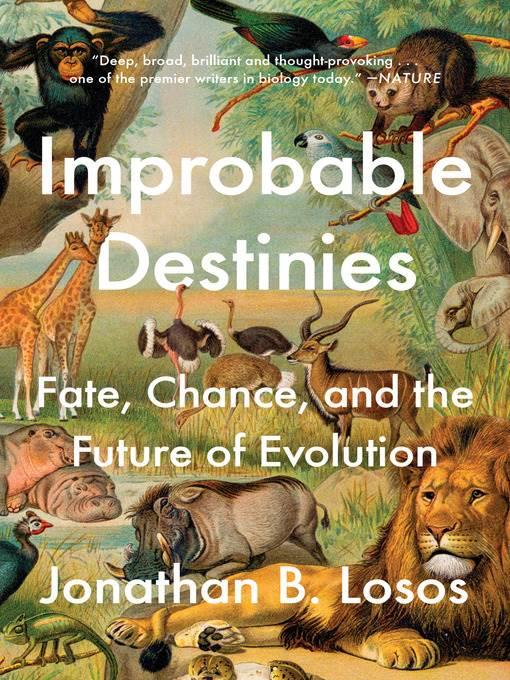
Improbable Destinies
Fate, Chance, and the Future of Evolution
- اطلاعات
- نقد و بررسی
- دیدگاه کاربران
نقد و بررسی

May 22, 2017
Losos (Lizards in an Evolutionary Tree), professor of biology at Harvard, explores whether evolution is deterministic or subject to various contingencies, along the way posing two even more basic questions: How do we know what we know, and can ecology be considered an experimental science? Describing both field and laboratory work, Losos demonstrates how the combination of experimentation and observation has led to great insight into nature. Whether he is discussing his own research on lizards in the Bahamas or the work of other researchers in the Galapagos, British Columbia, or a laboratory at Michigan State, Losos explains both the science and the underlying philosophy of the questions being asked in an accessible and engaging manner. Unsurprisingly, the answer to his original question remains inconclusive. He makes clear that evolution proceeds similarly in many situations, though small, random perturbations can apparently lead to divergent outcomes that make evolution less predictable than some scientists would have us believe. Losos’s conclusion is well summarized when he quotes biologist Rich Lenski: “Both sets of forces—the random and the predictable, as it were—together give rise to what we call history.” The book is as enjoyable as it is informative, and it demonstrates how scientists think critically and assess data carefully. Illus. Agent: Max Brockman, Brockman Inc.

Starred review from June 1, 2017
A fresh take on evolution and how "we can study [it] as it occurs, right before our eyes."Good books on evolution appear regularly. In this excellent book, Losos (Biology/Harvard Univ.; Lizards in an Evolutionary Tree: Ecology and Adaptive Radiation of Anoles, 2009, etc.), the curator of herpetology at Harvard's Museum of Comparative Zoology, asks a big question that readers may not have considered: is evolution predictable? The author delivers an often startling, convincing, and entirely satisfying answer. In Hollywood science fiction, intelligent beings from distant planets look like us with a few tweaks. Science buffs sneer, but Losos maintains that this is reasonable. Provided the far-off planet's environment resembles ours, life will evolve more or less in parallel. "There are limited ways to make a living in the natural world," writes the author, "so natural selection drives the evolution of the same features time and again." This is convergence, a process in which unrelated organisms develop similar traits as they evolve in similar environments. The iconic example: when a mammal and a reptile evolved to live in the ocean, the creatures (dolphin, ichthyosaur) looked alike and little different from a tuna. Even more startling, evolution itself has become an experimental science. A brilliant experimenter, Darwin never tested his greatest idea because he thought natural selection occurred at a glacial speed. In fact, when pressures are strong, species change visibly within generations. Losos devotes the second half of the book to juicy, hair-raising, if sometimes-tedious experiments in which scientists show evolution occurring before their eyes. Protected from grazing rabbits, plants run wild within years. Nearly 65,000 generations of bacteria, carefully observed over three decades, have undergone profound, permanent changes. Years of measuring lizard legs (the author's specialty) or decades devoted to finch beaks or guppy color also turn up solid genetic transformation. A cheerful, delightfully lucid primer on evolution and the predictive possibilities within the field.
COPYRIGHT(2017) Kirkus Reviews, ALL RIGHTS RESERVED.

Starred review from July 1, 2017
Was the duck-billed platypus an evolutionary inevitability? Or did this strange creature evolve because of some unlikely disruption in nature? Australia's most peculiar mammal counts as just one of the many species Losos scrutinizes as he assesses the relative impact on evolution of the predictable and the random. Losos frames his illuminating foray into evolutionary theory as a response to Stephen Jay Gould's argument that evolution unfolds so erratically that if we could reset the world's natural history to zero, the next iteration of that history would yield entirely different results. Venturing to the frontiers of biological research, Losos adduces evidence both undermining and buttressing Gould's claim. Readers learn a great deal about how convergent evolution pushes widely separated populations of microbes, fish, birds, lizards, and mice along remarkably paralleland predictablepaths of species development, so long as they face similar natural stresses. However, readers also learn about far less scripted evolutionary trajectories issuing in one-of-a-kind species: platypus, chameleon, kiwi, and human. In a refreshingly accessible narrative, laced with piquant anecdotes, Losos underscores the human significance of science affecting not only how we interpret our own place on the planet but also how we envision life in distant galaxies. Wonderfully lucid; singularly engaging.(Reprinted with permission of Booklist, copyright 2017, American Library Association.)




دیدگاه کاربران